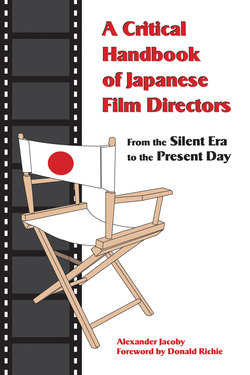Читать книгу A Critical Handbook of Japanese Film Directors - Alexander Jacoby - Страница 15
На сайте Литреса книга снята с продажи.
FURUHATA Yasuo
Оглавление(b. August 19, 1934)
降旗康男
A proficient commercial director, Furuhata made his debut with the youth film Bad Girl Yoko (Hikō shōjo Yōko, 1966), about a girl who, along with her boyfriend, escapes Japan by boarding a boat to San Tropez. He truly cut his teeth, however, on two popular series of Toei action pictures: Modern Yakuza (Gendai yakuza), of which he directed two episodes, and Abashiri Prison (Abashiri bangaichi), to which he contributed six. The latter series cemented a productive working relationship with tough-guy star Ken Takakura, and, with its Hokkaido settings, established the director’s penchant for snowbound locations.
Furuhata worked again with Takakura on Winter Flower (Fuyu no hana, 1978), about a former yakuza looking after the teenage daughter of a fellow gangster for whose death he was responsible. The film’s mood earned comparisons with French crime pictures. Takakura also starred in Station (Eki, 1981), following twelve years in the life and career of a policeman who also competes as an Olympic sharpshooter, and Demon (Yasha, 1985), about an ex-criminal who has left the gangster life to marry and work as a fisherman in a coastal village. Both films centered more on personal drama than on action: Demon was a mature character study, rich in local color and commenting intelligently on the reaction of small communities to such ostensibly urban phenomena as alcohol abuse, gambling, and crime. Though this film included action scenes more typical of a crime thriller, Furuhata also made more straightforwardly dramatic films, often with romantic themes. Love (Izakaya Chōji, 1983) charted the enduring passion between former lovers. Buddies (A un, 1989) was an account of a friendship destroyed by the unspoken love of one friend for the wife of the other; it was set against the backdrop of prewar society and politics, as was Winter Camellia (Kantsubaki, 1992), a story about rival politicians and the yakuza who work for them competing for the favor of a geisha in the provincial city of Kōchi. Time of Wickedness (Ma no toki, 1985), considered by Japanese critics to be Furuhata’s masterpiece, was a study of an incestuous relationship between mother and son.
Furuhata’s biggest hit, however, was The Railroad Man (Poppoya, 1999), a sentimental melodrama again starring Takakura as the ageing stationmaster of a declining former mining town in Hokkaido. While expertly made, the film was, in Raymond Durgnat’s phrase, a “male weepie,” idolizing a hero who puts work before family even when his wife and child are dying. Another hit was The Firefly (Hotaru, 2001), a film about the survivors of the kamikaze corps, which examined the role of servicemen from colonized Korea in the war effort. The melodramatic Red Moon (Akai tsuki, 2004) also evoked the war, dramatizing the loves and sufferings of colonists in Manchuria at the time of the Soviet invasion. It was criticized in some quarters for ignoring the cruelties the Japanese inflicted on the local population; Mark Schilling hinted that Furuhata’s implicitly nationalist attitudes have denied him an international reputation. Nevertheless, his consistent commercial and intermittent critical success within Japan suggest that his oeuvre might merit further exploration.
1966 Hikō shōjo Yōko / Bad Girl Yoko
Jigoku no okite ni asu wa nai / The Law of Hell Has No Tomorrow
1967 Gyangu no teiō / The Sovereign of All Gangsters / Gang 11
Chōeki jūhachinen: Karishutsugoku / Parole (lit. 18 Years’ Penal Servitude: Parole)
1968 Gokuchū no kaoyaku / The Boss in Jail
Uragiri no ankokugai / Treacherous Underworld
1969 Gendai yakuza: Yotamono no okite / Modern Yakuza: Gangster Code
Gendai yakuza: Yotamono jingi / Modern Yakuza: Honor among Gangsters
Shin Abashiri bangaichi: Runin misaki no kettō / New Abashiri Prison: Bloody Battle of Exile Cape
1970 Nihon jokyōden: Makkana dokyōbana / Chronicle of Strong Women of Japan: Bright Red Flower of Courage
Ninkyō kōbō shi: Kumichō to daigashi / History of the Rise and Fall of Chivalry: The Boss and the Moneylender’s Agent
Sutemi no narazumono / Desperate Outlaw
Shin Abashiri bangaichi: Daishinrin no kettō / New Abashiri Prison: Bloody Battle of the Great Forest
Shin Abashiri bangaichi: Fubuki no hagure ōkami / New Abashiri Prison: Stray Wolf in a Snowstorm
1971 Gorotsuki mushuku / Wandering Rogue
Shin Abashiri bangaichi: Arashi o yobu Shiretoko misaki / New Abashiri Prison: Stormy Cape Shiretoko
Shin Abashiri bangaichi: Fubuki no daidassō / New Abashiri Prison: Great Escape in a Snowstorm
1972 Nihon bōryokudan: Koroshi no sakazuki / Japan’s Violent Gangs: Killers’ Cup
Shin Abashiri bangaichi: Arashi yobu danpu jingi / New Abashiri Prison: Stormy Dump Truck
Honor
1973 Shikima ōkami / Sex-Crazed Wolf
1974 Yoru no enka: Shinobigoi / Night Ballad: Hidden Love
1978 Fuyu no hana / Winter Flower
1979 Honjitsu tadaima tanjō / Just Born Today
Waga seishun no irebun / Our Youth’s Eleven
Nihon no fikusā / Japanese Fixer
1981 Shikakenin Baian / Baian the Assassin
Eki / Station
1983 Izakaya Chōji / Love (lit. Bar Choji)
1985 Ma no toki / Time of Wickedness
Yasha / Demon
1987 Wakarenu riyū / Reason for Not Divorcing
1989 Shōgun Iemitsu no ranshin: Gekitotsu / Shogun’s Shadow / Gekitotsu: The Insanity of Shogun Iemitsu (lit.)
Gokudō no onnatachi: Sandaime anego / Yakuza Wives: Third Generation Female Boss
A un / Buddies (lit. Alpha and Omega)
1990 Tasumania monogatari / Tasmania Story
Isan sōzoku / Inheritance
1991 Don ni natta otoko / The Man Who Became a Don
1992 Kantsubaki / Winter Camellia
1994 Shin gokudō no onnatachi: Horetara jigoku / New Yakuza Wives: Hell If You Fall in Love
1995 Kura / Kura (lit. Storehouse)
1997 Gendai ninkyōden / A Story of Modern Chivalry
1999 Poppoya / The Railroad Man
2001 Hotaru / The Firefly
2004 Akai tsuki / Red Moon
2007 Tsukigami / The Haunted Samurai
